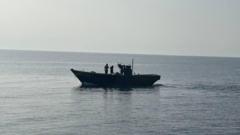The repatriation process faced challenges due to severed communication between the Koreas, and analysts highlight the implications for both nations as dynamics evolve post-return.
South Korea Repatriates Six North Koreans Seeking to Return Home

South Korea Repatriates Six North Koreans Seeking to Return Home
The South Korean government has returned six North Koreans, including two with prolonged stays, after they expressed a desire to go back to their homeland.
South Korea has repatriated six North Koreans who accidentally crossed into southern waters, affirming their desire to return home, according to Seoul's Ministry of Unification. Among them, two individuals had been in the South since March for four months—marking the longest duration recorded for non-defectors—while the other four were sailors who drifted across the contentious maritime boundary in May.
This marks the first repatriation of North Koreans since Lee Jae-myung took office as the South’s president, amidst his campaign promise of fostering better inter-Korean relations. Attempts to coordinate the return took months, reflecting the increasing strain in communications that have stemmed from political tensions on the Korean Peninsula. As of April 2023, North Korea severed virtually all lines of communication with the South, and a recent declaration by Kim Jong Un claimed that unification is no longer feasible.
Despite efforts from Seoul's Ministry of Unification to notify the North of the repatriation intentions through the United Nations Command, no responses were received. However, North Korean vessels were observed near the handover site on Wednesday, implying possible clandestine negotiations.
Experts warn that upon their return, the six individuals will likely endure intense questioning regarding their experiences in the South. Nam Sung-wook, a former head of the Korea National Strategy Institute, noted that the interrogation will aim to uncover any intelligence they may have obtained. Additionally, it is speculated that their desire to return bolsters the legitimacy of the Kim regime.
Context surrounding the timing of the boats drifting south indicates that political instability in South Korea—including interim leadership following the impeachment of former President Yoon Suk Yeol—may have contributed to the delays in decision-making regarding the repatriation. Michael Madden from the Stimson Center pointed out that mistrust could have influenced both Koreas’ actions amid perceived international scrutiny.
The unexpected return has raised concerns among activists and North Korean defectors. Lee Min-bok, a prominent activist, criticized the decision not to offer the individuals a chance to interact with defectors, which he believes could have educated them about South Korean life and the historical context of their plight.
Meanwhile, President Lee has initiated measures aimed at reducing tension, such as halting loudspeaker propaganda broadcasts across the border, as his administration seeks to re-establish dialogue with Pyongyang. However, analysts caution that despite this openness, current geopolitical alliances—particularly North Korea’s collaboration with Russia—might limit significant advancements in inter-Korean relations. Public sentiment in South Korea also appears to lean against a rapprochement, suggesting that substantial communication improvement remains elusive.





















